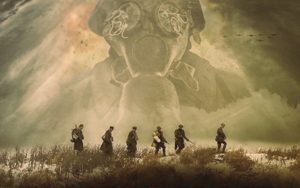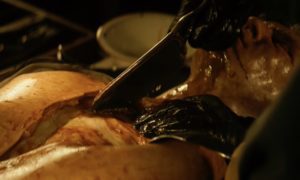What do you get when you mix The Thing with Nazis, British troops and biological warfare? You get the WWI body horror gorefest, Trench 11. I was lucky enough to speak with Leo Scherman, the writer/director of the film. We chatted about his influences, making a period piece, and what it was like to work under body horror master, David Cronenberg. Be sure to also check out my review for Trench 11.
Tiffany Blem: I watched Trench 11 a few days ago, and thought it was amazing. The gore in there… I loved it. So I’m very excited for this.
Leo Scherman: Oh, thank you!
Tiffany Blem: I read that you studied under David Cronenberg! That’s very impressive. He helped pioneer the body horror subgenre. In your film, Trench 11, which is all about body horror, there were a lot of things reminiscent to Cronenberg, some wonderful instances. What draws you to body horror?
Leo Scherman: I can answer the question by saying this: I am definitely influenced by David Cronenberg, having worked under him and watched him first hand direct. I’ve known him for some years now, and he’s critiqued some of my work. So, I’m definitely influenced by him. And to add further to that, I’m a Canadian director who made a horror film… how can you not be influenced by David Cronenberg? But the body horror thing, really, wasn’t by design. It really was more born from a realistic way of telling the story. It really came out of me while doing research with my co-writer, Matt [Booi], about the Germans and the allies were doing during WWI in terms of chemical warfare and germ warfare. They were doing a lot. We actually had an earlier draft of the script where it wasn’t body horror, it was something a little bit more supernatural and sci-fi, actually. It wasn’t really landing properly, so I had to circle back and figure out what could the Germans be doing that was rooted in a realistic scenario?
I ended up actually talking to a friend of mine, a medical surgeon, and explained to him how the Germans were experimenting with Anthrax and cholera with the intent of destabilizing the enemy’s livestock, because if you can destabilize their livestock, you can cut off their means of food. From that idea in talking to him, we got this idea of the worm, this parasitic worm, which is really born from the idea of heartworm that cat and dogs get, because it actually makes sense that you would experiment with that because it’s a very effective tool if you’re able to harness it. So that’s really where it came from. Once it got to that – and it obviously has horrific consequences and it’s very cinematic – then that’s really what determined the body horror aspect. It wasn’t really so much an attempt to reference Cronenberg, but I think once I knew I was going to do that, I was very determined to do it with old school practical effects, and that is what makes it reminiscent of David’s work. If you go back to his earlier work with Scanners, The Fly, all that stuff like that, there is an obvious connection to that, and I’m certainly influenced by that aspect of it.

Tiffany Blem: You saying that about heartworm, I can really see that. It really does look like those pictures they show you of what’s happening inside your pet. With this type of story, you really could have set it anywhere. What made you set it during WWI?
Leo Scherman: You know, it’s just a long standing fascination. It was the other way around, in that the setting was first. I knew I wanted to make a WWI horror film, and then from working with Matt, the story took on the form it did. I guess you could say that I knew I wanted to make a WWI horror movie, and we discussed how I was influenced by Cronenberg, but I was also influenced by movies like The Thing, and so that’s sort of where the story formed. You have these men on a mission, and then this disease… it all came ultimately from the setting. We could have told a different story, and it still would have been in WWI, no matter what. That was always going to be a thing.

Tiffany Blem: I’m glad that you mentioned The Thing because that’s the first thing that came to mind when I watched the trailer before I watched the movie. I thought, “This is The Thing during WWI, and that’s going to be amazing because The Thing is a great movie.”
Leo Scherman: (laughs) The Thing is the best, right?
Tiffany Blem: Yes! And with the film being a period piece, did you have to do a lot of research to get it to be as accurate as possible?
Leo Scherman: Yes, there was a lot, and there was a goal from the very beginning, that despite the low budget and despite it having this kind of bio-terror horror element, the goal was to make it as historically accurate as possible. I was just fortunate enough that Matt had already worked on documentaries about WWI and specifically about the underground battles of WWI. He even went to some of the tunnels today for a specific documentary. So he had a wealth of knowledge, and then what he didn’t know, he researched, and my job was just to keep up with the pace and be brought up to speed. I just kept pushing for more details and making it as accurate as possible. I just kept learning, ultimately, from him with what he already knew, and then the new things he researched, he would then download to me.

Tiffany Blem: One thing I always ask is: what is your favorite scary movie?
Leo Scherman: Favorite scary movie? Jaws. Does that count? Is that scary?
Tiffany Blem: Oh, absolutely.
Leo Scherman: It’s always debatable on if it’s horror or not, but it’s definitely scary. Let me just say that I’m a huge fan of your publication. I know you guys well, and I really like it. I’m flattered that you’re able to talk to me, and I appreciate your time.
Tiffany Blem: I appreciate your time as well, and thank you so much!
Don’t forget to check out my review of Trench 11 right here, and stay tuned to PopHorror for all of your horror news, reviews and interviews!
 PopHorror Let's Get Scared
PopHorror Let's Get Scared




